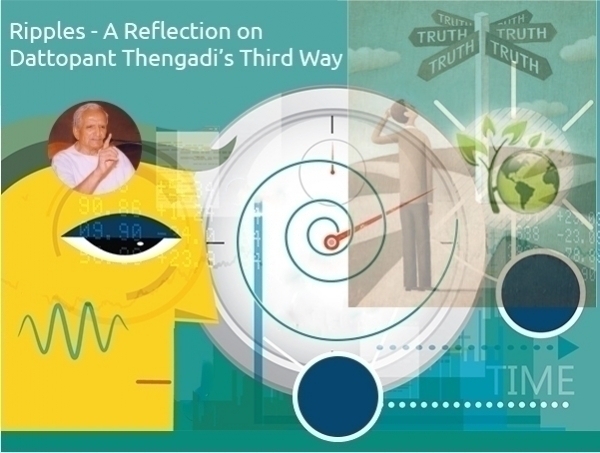Ripples A Reflection On Dattopant Thengadi's Third Way Part 54: On Revolution
Dattopant states that Vedic India witnessed the first ever revolution which was led by sages who were not politically interested.
Total Views |
I have been reflecting in my own way on Dattopant Thengadi Ji's Third Way. I present these small "ripples" that it has caused in my mind in a series. I am glad it has found its resonance in many thinking minds alike. I hope the readers have read the earlier article in the series before moving ahead.

(On Revolution- The paper submitted at a meeting of the National Executive of Bharatiya Majdoor Sangh in 1976)
Dattopant states that Vedic India witnessed the first ever revolution which was led by sages who were not politically interested. People killed the tyrant ruler Vena ( the story is interesting to read) and this was described as a duty to displace such rulers and save the people. Of course, this use of the term is totally different from the present implications of the term.
We, in our country, had many revolutionary leaders especially from 1857 to 1947. Even before this period, we had many revolutionary leaders who saved people from cruel kings.
Many inappropriately identify the term with Marxism. There are many significant examples of revolutions in world history. Violence is undeniably related to Marxism. Though it appeals to nationalism, it encompasses Internationalism too. It is observed, writes Dattopant, it absorbs the local culture and gets nationalised to some extent.
The pre-planned reaction to the actions of opportunists patronized by the government and unplanned violent reaction to organised ( with the tacit support of government) violent action are excluded as they fall outside the scope of the paper, though Dattopant gave many examples from history.
There are many genres of revolutions that have slightly different shades of meaning. Displacement of the present government has always been the aim. The means are different.
The word liberation has some positive connotations. When people are allotted a passive role usually the army dominates the rule but If it turns authoritarian people remain helpless again.
History has witnessed many violent revolutions. Che Guevara (an Argentine Marxist revolutionary, physician, writer, guerrilla leader, diplomat, and military theorist. A major figure of the Cuban Revolution, 1928 -1967) stated that when 'fight for social goals cannot be maintained within the framework of civil debate, discontent magnifies'.' If there is at least an appearance of legality the violent outbreak cannot be promoted till possibilities of peaceful struggle have not been exhausted.'
Dattopant notes that in spite of many factors that cause severe discontent in European countries and USA (on different issues), it did not culminate in any 'revolutionary efforts '. There were some efforts to achieve the goal using non-violent actions too. Violence was not appreciated in western democratic countries, but the situations in undemocratic countries were different.
The method of Guerrilla war and underground activities are used by some revolutionaries. Of course, it requires different types of leaders. Carlos Marighella ( who Faced a violent military dictatorship and an intimidating opposition, a writer-turned-politician, he articulated a resistance all the while ousting heinous crimes of torture) describes the qualities required by such leadership such as courage, a spirit of initiative, imagination and creativity. The leaders need mental quality more than physical toughness. (The book has a detailed description) It is stated that the struggle cannot be successful if it is not carefully carried out.


